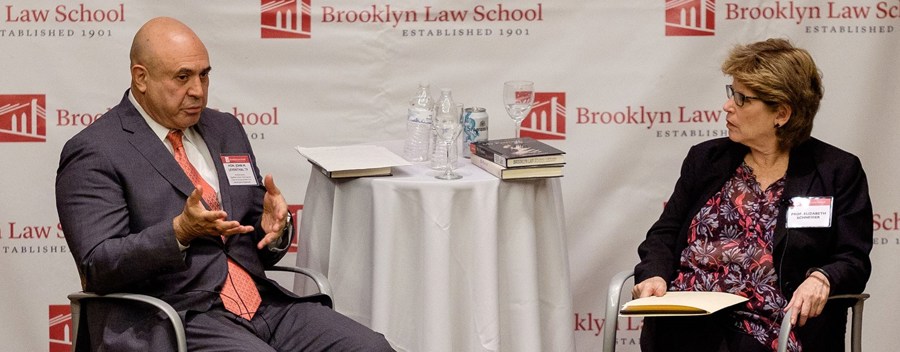
Hon. John M. Leventhal '79 joined Professor Liz Schneider to discuss the domestic violence epidemic
Hon. John M. Leventhal ’79, Associate Justice of the Appellate Division, Second Judicial Department, returned to Brooklyn Law School in November for a presentation and discussion with Professor Liz Schneider about the current domestic violence crisis. Leventhal, author of the book My Partner, My Enemy: An Unflinching View of Domestic Violence and New Ways to Protect Victims, presided over the first felony domestic violence court in the nation.“Between 1994 and 2010, domestic violence abated somewhat because women now have available to them shelters, orders of protection, civil and criminal prosecutions, and the fact that this is no longer a private matter, or simply a women’s issue,” Leventhal said.
One of the most difficult parts of working in domestic violence law is ensuring the safety of complainants, according to Leventhal.
“It always felt like we were a heartbeat away from tragedy,” he said. The domestic violence court developed a program that focused on protecting complainants while keeping the number of dismissals down. It was a difficult job, Leventhal said, and he never became immune to the harrowing stories of abuse and graphic photos of injuries.
Schneider, the Rose L. Hoffer Professor of Law, director of the Edward V. Sparer Public Interest Law Fellowship Program, and a nationally recognized scholar in women’s rights, domestic violence, and feminist legal theory, is the author of Battered Women and Feminist Lawmaking. She urged everyone to get more involved in preventing domestic violence.
“I would like to see a more public response on the part of both men and women on domestic violence,” she said. “It’s especially critical for men to say, ‘We regret the vision we have been given about violence against women,’ to march, and to take a moment and say ‘this is not us,’” she said.
Looking ahead, Leventhal said the legal system needs to rethink its definition of the crime to include different types of relationships and circumstances. He mentioned Australia’s National Domestic Violence Registry and a program in Israel that provides rehabilitative housing for abusers—instead of encouraging the abused to uproot their own lives—as useful models.
Leventhal is a frequent lecturer on evidence, domestic violence, elder abuse, guardianship, and other topics. He was a recipient of the Alumni of the Year award from the Brooklyn Law School Alumni Association in 2008.